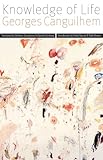Knowledge of Life / Georges Canguilhem.
Material type: TextSeries: Forms of LivingPublisher: New York, NY : Fordham University Press, [2022]Copyright date: ©2009Description: 1 online resource (200 p.)Content type:
TextSeries: Forms of LivingPublisher: New York, NY : Fordham University Press, [2022]Copyright date: ©2009Description: 1 online resource (200 p.)Content type: - 9780823229260
- 9780823291977
- online - DeGruyter
| Item type | Current library | Call number | URL | Status | Notes | Barcode | |
|---|---|---|---|---|---|---|---|
 eBook
eBook
|
Biblioteca "Angelicum" Pont. Univ. S.Tommaso d'Aquino Nuvola online | online - DeGruyter (Browse shelf(Opens below)) | Online access | Not for loan (Accesso limitato) | Accesso per gli utenti autorizzati / Access for authorized users | (dgr)9780823291977 |
Frontmatter -- Contents -- Foreword: Life, as Such -- Translators’ Note -- Introduction: Thought and the Living -- Part One. Method -- 1. Experimentation in Animal Biology -- Part Two. History -- 2. Cell Theory -- Part Three. Philosophy -- 3. Aspects of Vitalism -- 4. Machine and Organism -- 5. The Living and Its Milieu -- 6. The Normal and the Pathological -- 7. Monstrosity and the Monstrous -- Appendixes -- 1. Note on the Transition from Fibrillar Theory to Cell Theory -- 2. Note on the Relationship Between Cell Theory and Leibniz’s Philosophy -- 3. Extracts from the ‘‘Discours sur l’anatomie du cerveau’’ (‘‘Discourse on the Anatomy of the Brain’’), delivered by Nicolas Steno in Paris in 1665 to the ‘‘Messieurs de l’Assemble´e de chez Monsieur The´venot’’ in Paris -- Notes -- Bibliography -- Index
restricted access online access with authorization star
http://purl.org/coar/access_right/c_16ec
As the work of thinkers such as Michel Foucault, François Jacob, Louis Althusser, and Pierre Bourdieu demonstrates, Georges Canguilhem has exerted tremendous influence on the philosophy of science and French philosophy more generally. In Knowledge of Life, a book that spans twenty years of his essays and lectures, Canguilhem offers a series of epistemological histories that seek to establish and clarify the stakes, ambiguities, and emergence of philosophical and biological concepts that defined the rise of modern biology. How do transformations in biology and modern medicine shape conceptions of life? How do philosophical concepts feed into biological ideas and experimental practices, and how are they themselves transformed? How does knowledge "undo the experience of life so as to help man remake what life has made without him, in him or outside of him?" Knowledge of Life is Canguilhem's effort to explain how the movements of knowledge and life come to rest upon each other. Published at the dawn of the genetic revolution and still pertinent today, the book tackles the history of cell theory, the conceptual moves toward and away from mechanical understandings of the organism, the persistence of vitalism, and the nature of normality in science and its objects.
Mode of access: Internet via World Wide Web.
In English.
Description based on online resource; title from PDF title page (publisher's Web site, viewed 03. Jan 2023)


